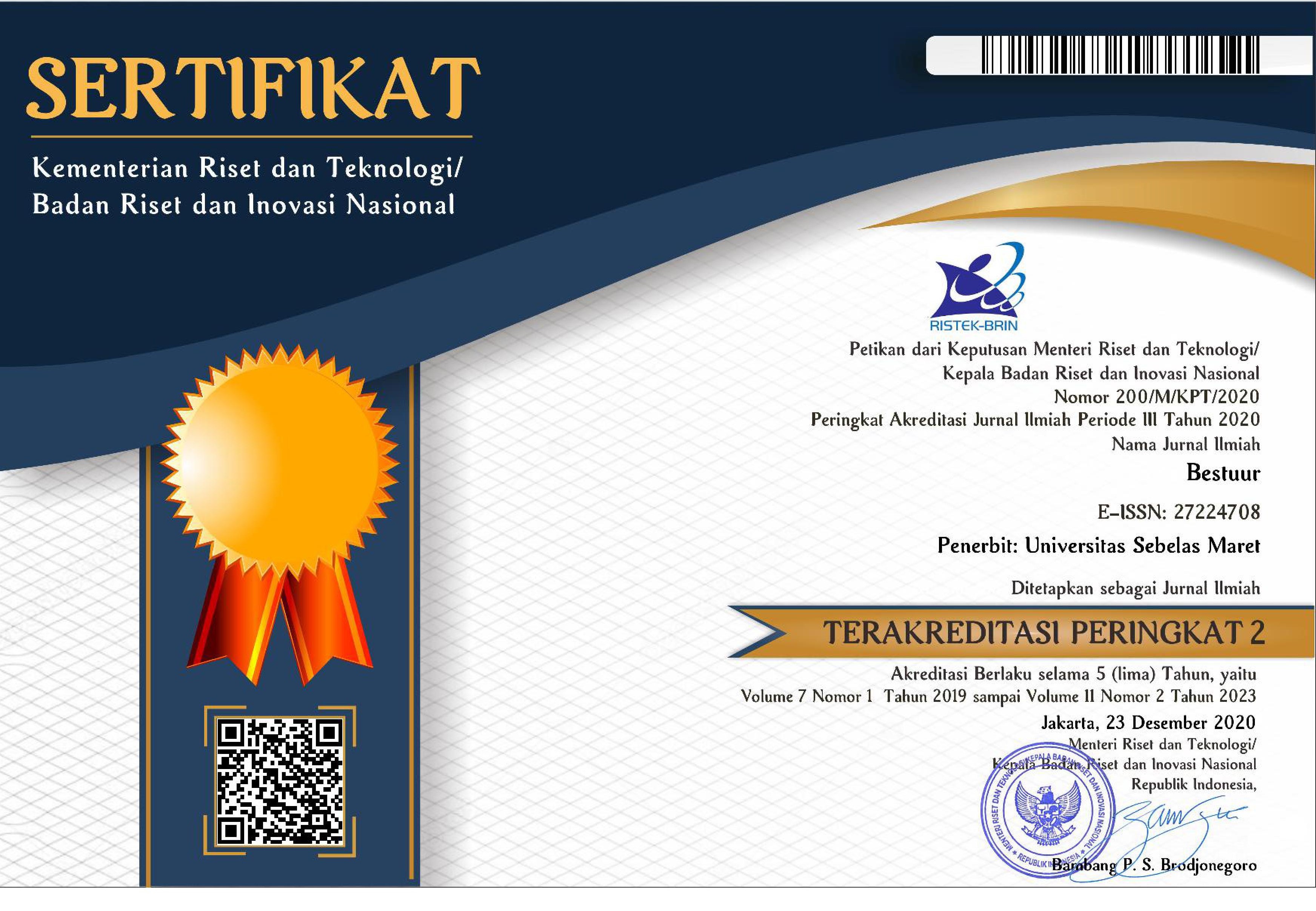Model Pelaksanaan Putusan Mahkamah Konstitusi yang Eksekutabilitas Dalam Pengujian Peraturan Perundang-Undangan di Indonesia
Abstract
This research is motivated by the number of unimplemented Constitutional Court decisions, although the nature of the Constitutional Court 's rulings is final and binding. This form of work is ethical normative. That investigation is descriptive. The data type used is the secondary data. Secondary techniques for the processing of data were obtained through library work. Primary and secondary data were qualitatively analysed. The results of the study show that, first, the decision of the Constitutional Court, which is not implementing the compilation of its decision, does not include a time limit for its implementation, while the decision of the Constitutional Court, which contains a grace period, is quickly followed through the establishment of an invitation regulation. Second , the model of the future functional decision of the Constitutional Court is the decision of the Constitutional Court which contains a period of grace and the institutionalization by constitutional permit of constitutional questions.
Keywords: Constitutional Court, time of grace and Issue of the Constitution.
Full Text:
PDFReferences
Alec Stone Sweet “The Politics of Constitutional Review in France and Europe”, International Journal of Constitutional Law, Vol. 5 No. 1, Januari 2007, Faculty of Law Oxford Universty.
Alexander Hamilton, 1995, Federalist 78. In The Federalist Papers, Mentor, New York, hlm. 30.
Allan Brewer-Carias,. “Constitutional Courts As Positive Legislators In Comparative Law”, General Report on XVIII International Congress of Comparative Law, Washington, 2010.
Amiruddin, “The Competence of Pretrial Since the Decision of Constitutional Court No. 21-PUU-XII-2014”, Journal of Legal, Ethical and Regulatory Issues, Volume 21, Issue 2, 2018.
Arief Ainul Yaqin, 2018, Constitutional Question: Kewenangan yang Terlupakan dan Gagasan Untuk Melembagakannya di Mahkamah Konstitusi, Sinar Grafika, Jakarta.
Bayu Dwi Anggono, “The Politics of Law On The Formation of Responsive, Participative and Populist Legislation “, International Journal of Business, Economics and Law, Vol. 9, Issue 4 , April 2016.
Dudu Duswara Machmudin, “Modernization and Acceleration of Case Standard Handling and Reviewing on Indonesia Supreme Court”, Journal of Legal, Ethical and Regulatory Issues, Volume 21, Issue 3, 2018.
Fajar Laksono Soeroso, “Pembangkangan terhadap Putusan Mahkamah Konstitusi: Kajian Putusan Nomor 153/G/2011/PTUN_JKT” Jurnal Yudisial Komisi Yudisial, Vol.6 No.3 Desember Tahun 2013.
Fajar Laksono, Sudarsono, Arief Hidayat and Muchammad Ali Safaat, “Relation between the Constitutional Court of the Republic of Indonesia and the Legislators according to the 1945 Constitution of the Republic of Indonesia ”, Constitutional Review, December 2017, Volume 3, Number 2.
Hermawan Wasito, 1997, Pengantar Metodologi Penelitian Buku Panduan Mahasiswa, PT. Gramedia Pustaka Utama, Jakarta, hlm. 1.
I Dewa Gede Palguna, “Constitutional Complaint and the Protection of Citizens the Constitutional Rights”, Constitutional Review, May 2017, Volume 3, Number 1.
I Dewa Gede Palguna, “Constitutional Question: Latar Belakang dan Praktik Di Negara Lain Serta Kemungkinan Penerapannya Di Indonesia”, Jurnal Hukum, Vol. 17 No. 1, 16 Januari 2010, hlm. 119.
I Dewa Gede Palguna, 2013, Pengaduan Konstitusional (Constitutional Complaint): Upaya Hukum terhadap Pelanggaran Hak-Hak Konstitusionalitas Warga Negara, Sinar Grafika, Jakarta.
Keenan D. Kmiec, “The Origin and Current Meanings of ‘Judicial Activism”,California Law Review, Volume 92, Issue 5, Oktober 2004
Luthfi Widagdo Eddyono, “Independence Of The Indonesian Constitutional Court In Norms And Practices”, Constitutional Review, May 2017, Volume 3, Number 1.
Mahkamah Konstitusi, “ Rekapitulasi Perkara Pengujian Undang-Undang”, https:// mkri. id/index.php?page=web.RekapPUU&menu=5, diakses pada Tanggal 20 September 2019, Pukul 22.00 WIB.
Maria SW. Sumardjono, 2014, Metodologi Penelitian Ilmu Hukum, Gadjah Mada Press, Yogyakarta.
Muchamad Ali Safaat, Aan Eko Widiarto dan Fajar Laksono Suroso, “Pola Penafsiran Konstitusi dalam Putusan Mahkamah Konstitusi Periode 2003- 2008 dan 2009 – 2013”, Jurnal Konstitusi, Volume 14, Nomor 2, Juni 2017.
Pan Mohamad Faiz, “Dimensions of Judicial Activism In The Constitutional Court Decisions”, Jurnal Konstitusi, Volume 13, Nomor 2, Juni 2016.
Soerjono Soekanto, 2018, Penelitian Hukum Normatif Suatu Tinjauan Singkat, Rajawali Press, Jakarta.
Suharsimi Arikunto, 2018, Prosedur Penelitian Suatu Pendekatan, Rineka Cipta, Jakarta.
Syukri Asy'ari, Meyrinda Rahmawaty Hilipito dan Mohammad Mahrus Ali, “Model dan Implementasi Putusan Mahkamah Konstitusi dalam Pengujian Undang-Undang (Studi Putusan Tahun 2003-2012)”, Jurnal Konstitusi, Volume 10, Nomor 4, Desember 2013.
Yustina Trihoni Nalesti Dewi, W. Riawan Tjandra, and Grant R. Niemann, “Independence of Judicial Power as a Foundation of Human Rights Judicial Function in Indonesia,” International Journal of Social Science and Humanity, Vol. 6, No. 3, March 2016.
DOI: https://doi.org/10.20961/bestuur.v7i1.42700
Refbacks
- There are currently no refbacks.
Copyright (c) 2020 I Gusti Ayu Ketut Rachmi Handayani, Lego Karjoko, Abdul Kadir Jaelani
License URL: https://creativecommons.org/licenses/by/4.0/
|











_CROSREF.jpg)




